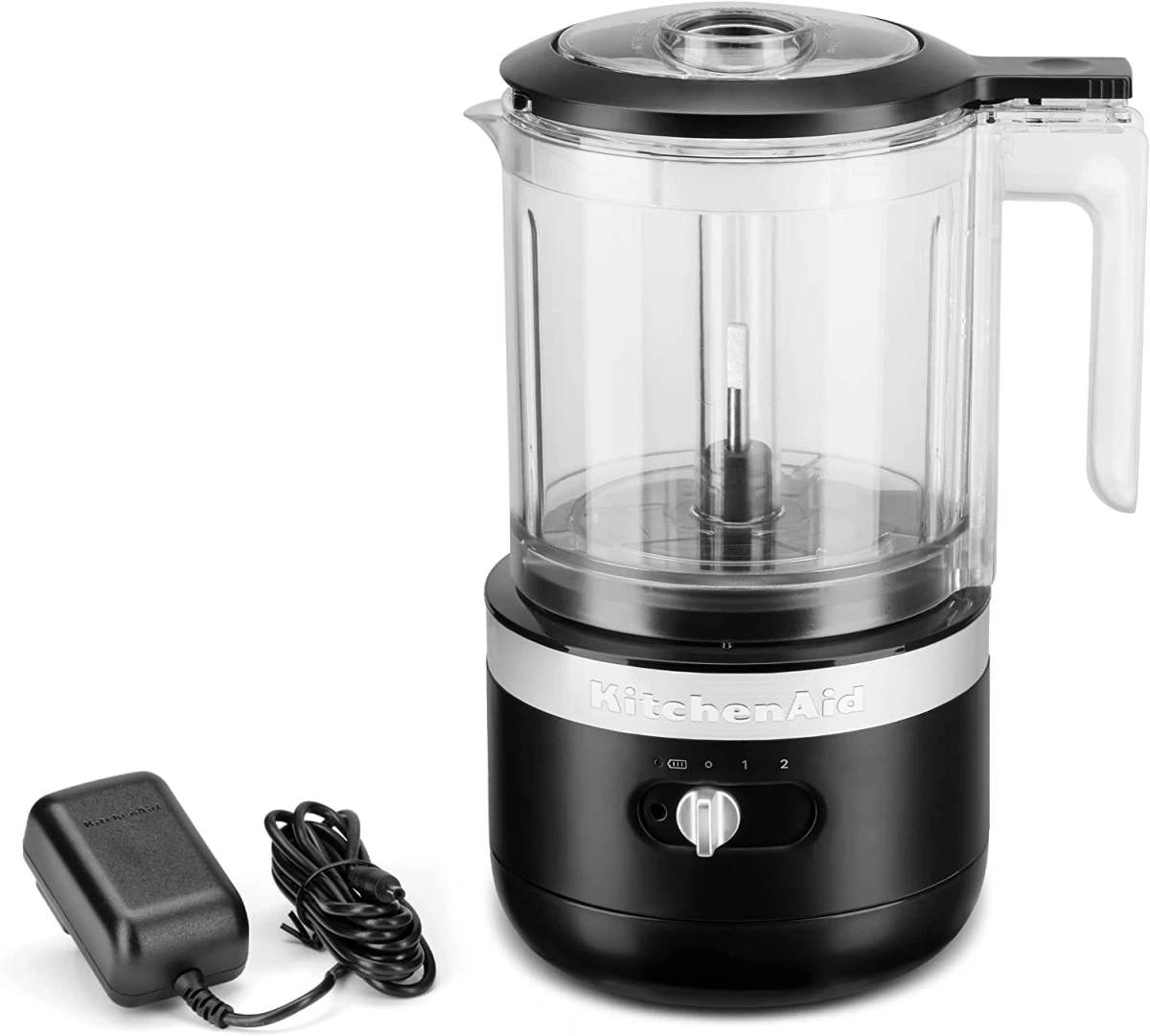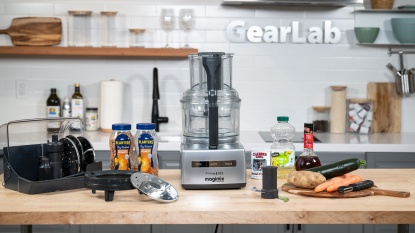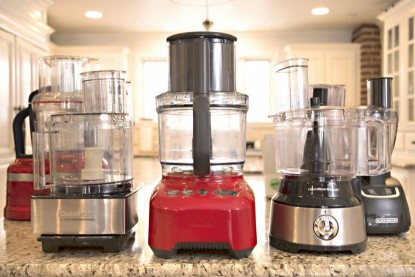KitchenAid 5-Cup Review
Our Verdict
Compare to Similar Products
 This Product KitchenAid 5-Cup | |||||
|---|---|---|---|---|---|
| Awards | Best Bang for the Buck | Best on a Tight Budget | A Compact Bargain Option | ||
| Price | $100 List $99.99 at Amazon | $250 List $184.99 at Amazon | $55 List $59.83 at Amazon | $120 List $99.99 at Amazon | $40 List $42.99 at Amazon |
Overall Score  |
|||||
| Star Rating | |||||
| Bottom Line | A food processor that can chop some veggies and make sauces, but only if you're making single-serving portions | Best overall performing model for the price | It won't slice down the competition but will chop up its price tag | Delivering excellent performances in the majority of our tests, we think this is a great kitchen appliance for anyone shopping for quality on a limited budget | This is the cheapest, lowest-performing food processor in our fleet |
| Rating Categories | KitchenAid 5-Cup | Cuisinart Custom 14 | Hamilton Beach 10-Cup | Ninja Professional | Black+Decker 8-Cup |
| Chopping (20%) | |||||
| Mixing (20%) | |||||
| Pureeing (20%) | |||||
| Shredding (15%) | |||||
| Slicing (15%) | |||||
| Cleaning (10%) | |||||
| Specifications | KitchenAid 5-Cup | Cuisinart Custom 14 | Hamilton Beach 10-Cup | Ninja Professional | Black+Decker 8-Cup |
| Largest Bowl Size | 5 cup | 14 cup | 10 cup | 9 cup | 8 cup |
| Time to Make Nut Butter | 30 min | 19 min | 10 min | 7 min | 25 min |
| Motor | 240 Watt | 720 Watt | 450 Watt | 850 Watt | 450 Watt |
| Decibels at 3 ft | 57 dB | 61.5 dB | 96 dB | 80 dB | 95 dB |
| Accessory Storage Case | No | No | No | No | No |
| Measured Weight of Base | 1.8 lb | 12.4 lb | 3.1 lb | 4.5 lb | 3.1 lb |
| Dimensions | 6" L x 7.5" W x 10.5" D | 10.75" L x W: 7.75" W x 15" D | 8.5" L x 10.5" W x 15.5" D | 7.3" L x 9.9" W x 15.6" D | 10.7" L x 7.5" W x 15.3" D |
| Speed Control | Off/1/2 | On/Off/Pulse | High/Low/Pulse/Off | Chop/Puree/Dough/Disc/Low/High/Pulse | On/Off/Pulse |
| BPA Free | Yes | Yes | Yes | Yes | No |
| Mini Bowl Blade | N/A | Yes | N/A | N/A | N/A |
| Feet | Smooth Rubber (Non-Skid) | Smooth Rubber | Suction Cups | Suction Cups | Suction Cups |
| Cord Storage | Cordless (unless charging but there is no cord storage on the base) | None | Internal | External Cord Wrap | Underside Cord Wrap |
| Slicing Disc | No | Non adjustable | Non adjustable | Non adjustable | Non adjustable |
| Shredding Disc | No | Medium | Medium | Non adjustable | Medium |
| Dough Blade | No | No | No | Yes | No |
| Whipping Attatchment | No | No | No | No | No |
| Citrus Juicer | No | No | No | No | No |
| Dicing Kit | No | No | No | No | No |
| Built-in Bowl Scraper | No | No | Yes | No | No |
| French Fry Disc | No | No | No | No | No |
| Julienne Disc | No | No | No | No | No |
| Model # | KFCB519 | DFP-14BCNY | 70730 | BN600/BN601 | FP1600B |
Our Analysis and Test Results
The KitchenAid 5-Cup is a small footprint model with limited capacity in its pitcher. It comes with two power options and has a built-in rechargeable battery. It is worth noting that the machine can not be operated while charging. A pulse button controls the power on the pitcher handle, so operating the motor is only possible while gripping the pitcher. Although we noted several drawbacks to this model, we were pleasantly surprised by certain results.
Chopping
In the kitchen, we put our lineup to the test, chopping onions, carrots, and nuts. The KitchenAid 5-Cup has a singular pulse button on the handle. To use the device, just press and hold the button; once released, the motor stops. Overall, we noticed decent chopping results across the tests, but they were dampened by the pre-processing required to fit our food into the bowl.
Before we could begin chopping onions, our tester had to quarter them in order to fit in the 5-Cup. Processing was a delicate balance, as the line between large pieces and over-processed was the difference of only a couple of pulses.
Carrots, too, required quartering before they fit in the pitcher. However, the results were good, with no chunks or even noticeably larger pieces after chopping. The KitchenAid actually exceeded the carrot chopping scores over other units, taking only six pulses to chop the carrots completely.
Almond chopping was a slightly tedious task. After only three pulses, our testers had to remove the lid and clear out some stuck and unchopped nuts from around the blade. The KitchenAid 5-Cup eventually chopped all the nuts; however, we could only fit 2.5 cups of almonds before filling the pitcher to the brim.
Mixing
To test mixing capabilities, we attempted to make a standard recipe for pizza dough, mayonnaise, and pie crust from scratch with each of our food processors. The KitchenAid 5-Cup performed well but suffered a serious disadvantage in performance due to its small bowl size. The recipes had to be split in half in order to fit inside the device.
Unfortunately, even once the dough ball started to form, the pitcher was too small to enable free rotation around the blades. Complicating matters further, we had to stop and charge the device two separate times while mixing as it ran out of charge midway through. This was a headache since, as mentioned, it cannot be used while charging.
The pie crust went similarly to the pizza dough. The pulse button created a varying speed, and it was difficult to add ingredients in a way that ensured appropriate consistency.
The mayonnaise test with the KitchenAid was a great success. Puffy, whipped texture and a perfect taste.
Pureeing
Our puree test entailed making hummus, nut butter, tomato sauce, and applesauce from scratch. Lastly, a dedicated leak test was conducted to verify the integrity of the pitcher. Ultimately, the KitchenAid did not meet our standards.
Making hummus was once again difficult due to capacity issues. The 5-cup pitcher could only puree a single can of chickpeas at a time and still struggled, jammed, and required unclogging over the five minutes it took to puree a coarse hummus.
Making homemade tomato sauce with the device was successful. We were able to completely puree the tomatoes and chop the garlic moderately, resulting in a usable tomato sauce. All this was completed on a single charge.
Nut butter testing was a different story. This device's short battery life limited the ability to puree consistently, resulting in two minutes of use before needing a charge. In addition, the small pitcher size resulted in an excessively long prep time (almost an hour) for a limited amount of nut butter, even if it was a thick and creamy consistency.
Our applesauce recipe called for three apples, but only one apple was able to fit in the KitchenAid. Even then, the processor didn't have enough power to chop through a handful of apple slices.
The spillage rate was tested by filling each processor with water to its maximum fill line, then powering on the device. The KitchenAid started leaking before we even powered it on; although it has a rubber seal it appears loose. Once powered on, water sprayed everywhere.
Shredding
Although many processors offer different shredding options and blades, the KitchenAid has only a low and high power setting — no disc or cutting options.
Cheese shredding was done by fitting half-inch cubes into the block; once the cubes fit, the 5-Cup chops them into even pieces, although our testers considered the results closer to “chopped cheese” rather than shredded.
Carrots and potatoes were unable to be shredded at all. The potato skewered onto the end of the blade, and the carrot was chopped successfully but not shredded.
Slicing
As with shredding, the KitchenAid only has one blade and offers no additional options for slicing work. We attempted to slice tomatoes, potatoes, and a zucchini. Unfortunately, we were met with failure on all three. Even after pre-chopping the food to fit in the pitcher, the food was stuck spinning on the blade in every test instead of being sliced.
Cleaning
A positive note about the KitchenAid was its ease of cleaning. Our testers were able to easily separate the pieces and spray them down to clean. As with other models, a bottle brush helps to clean hard-to-access areas.
Should You Buy the KitchenAid 5-Cup?
While its small size is ideal for those in small living quarters or limited storage room, the price and performance of the KitchenAid 5-Cup is underwhelming considering the competition in our review of food processors. There are other options that are both cheaper and better performers.
What Other Food Processors Should You Consider?
If your budget is your primary concern, the best price-to-performance option in our food processor lineup is the Hamilton Beach 10-Cup, which both outperforms and is less expensive than the KitchenAid. If you're looking for a step up in performance but still want a compact, space-saving design, the Ninja Professional Food Processor is only slightly more expensive and performs better in all of our tests. We'd recommend either of these models over the KitchenAid.


















